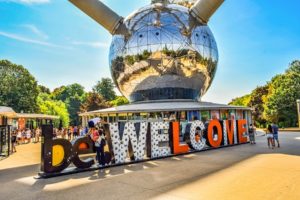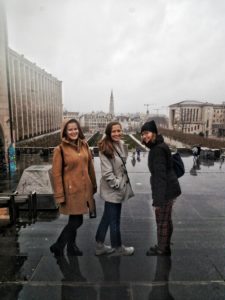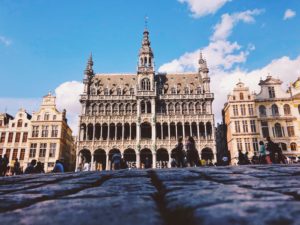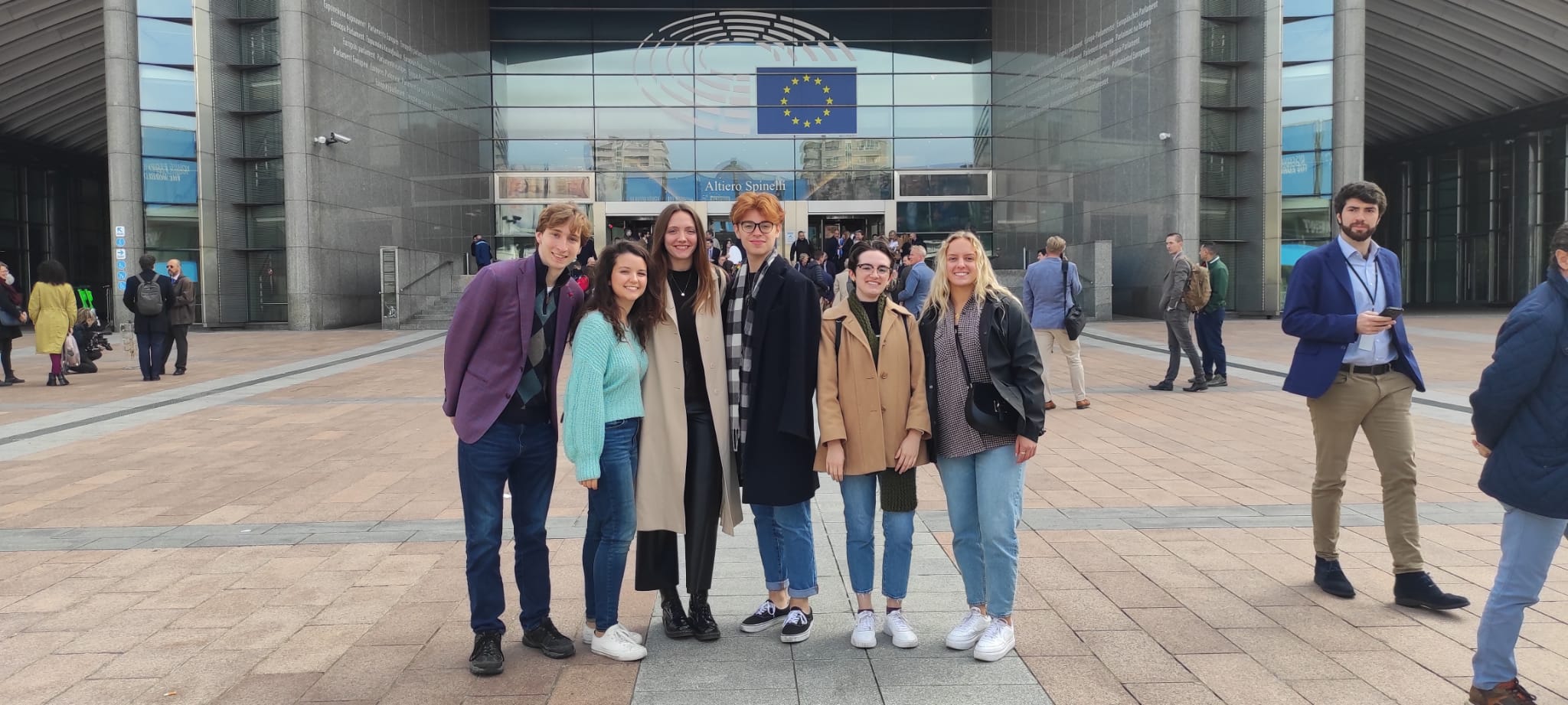Fall and Spring Multi-Destination Experiences in Siena and Brussels!
 It’s time to start thinking about your next steps. Where do you want to go? What do you want to do? Who do you want to be? A study abroad experience can be one of the most impactful ways to use your limited time at university. Of course, not all opportunities are the same. Discover why SIS Intercultural Study Abroad’s multi-destination programs can offer you so much more than everything else that’s out there.
It’s time to start thinking about your next steps. Where do you want to go? What do you want to do? Who do you want to be? A study abroad experience can be one of the most impactful ways to use your limited time at university. Of course, not all opportunities are the same. Discover why SIS Intercultural Study Abroad’s multi-destination programs can offer you so much more than everything else that’s out there.
Why Multi-Destination?
 At SIS we have more than fifteen years of experience in creating meaningful study abroad programs for students. We know the value of true intercultural experiences and how quality programs can have long lasting impact. Through our knowledge gained in Siena, Italy we are branching out and helping our students see with their own eyes, the interconnectedness of our world. Students will profoundly experience two realities through coursework, host families, cultural activities and internships.
At SIS we have more than fifteen years of experience in creating meaningful study abroad programs for students. We know the value of true intercultural experiences and how quality programs can have long lasting impact. Through our knowledge gained in Siena, Italy we are branching out and helping our students see with their own eyes, the interconnectedness of our world. Students will profoundly experience two realities through coursework, host families, cultural activities and internships.
European Diversity
By immersing yourself in local culture in both Siena, Italy and Brussels, Belgium you will be able to gain a greater understanding of Europe’s complexity. You’ll also be able to see for yourself what strength through diversity means to the European Union.
Some quick details:
- Full academic credit for one semester
- Language instruction in Italian AND French
- Host families in both Siena, Italy ad Brussels, Belgium
- Internships for all participating students in Brussels
- Cultural activities and events organized for all students
Contact us wit your questions!
 Program dates:
Program dates:
- Spring 2026
Monday, Jan. 19th – Saturday, May 2nd, 2026
Host Families in Siena and Brussels
We believe that there is no better way to experience local culture than living with locals. Students will experience Europe’s diversity in many ways, including exposure to daily life in both Italian and Belgian families. Host families also represent an important element in ensuring the personal safety of all of our students. We carefully select host families so that students will have local experts to help them navigate the cities and cultures.
Courses and Descriptions
The courses offered in Siena during the first 6 weeks are:
(45 total contact hours) The course is aimed at offering students a wide overview on the evolution of European relationships with developing countries, from the Eurocentric colonial past to the current international relations with these countries. Attention will be focused on the European Union’s institutional setup, presence in the international scenario and external policies. A specific concentration will be devoted to EU Development Policy. Its instruments and objectives will be analyzed as well as the complementarity between the activities of the Member States and those of the EU, and the coordination and coherence with the other fields of action having an impact on developing countries, such as security, agriculture, international trade and migration. This course is mandatory for all students on the Siena/Brussels program.
(45 total contact hours) The objective of this course is to give students a wide overview ofì multiculturalism, intercultural competencies and their related dimensions and aspects while providing them with the appropriate critical tools; its main goal is to train professionals endowed with a proper intercultural sensitivity and an attitude to reflect upon intercultural issues. This course is mandatory for all multi destination students (Siena – Brussels or Siena – Yaoundé).
Our educational approach includes Intercultural Dialogue and Reflection, a structured and guided reflection course. All students who come to SIS are required to follow this course. To read more about it click here. The Intercultural Dialogue and Reflection course will start during the 6 weeks in Siena and it is the only course which will also continue during the 8 weeks in our Francophone destinations. The reflection is in fact highly related to the Service-Learning approach since it helps to go deeper in the full immersion experience and it has to be both preparatory for the Service Learning experience that awaits our students in Brussels or Yaoundé, and parallel to it during their internships, shadowing or community service abroad. This course is mandatory for all multi destination students (Siena – Brussels or Siena – Yaounde). The credits that students will receive for it will be coupled to the community service or internship they will be doing in Brussels / Yaoundé. DOWNLOAD THE FULL COURSE SYLLABUS – Reflection_Syllabus
(45 total contact hours) This course is dedicated to the understanding of the institutions that deal with international education in the European context. It also explores the approach they adopt on promoting policies of internationalization, mutual learning, comparison and exchange of good practices. Attention will be put on the Education and Training 2020 (ET2020), a strategy developed by the European Commission and the policy-makers of the Member States and that focuses on promoting solutions to current educational and training issues. A specific focus will be also devoted to the EU Program “Erasmus Plus” that offers opportunities to study and train abroad to European and international students. Finally, the course will concentrate on the emerging internationalization of Education in Italy and its initiatives. This course is optional for all students who are going to Brussels after the 6 weeks. Students going to Brussels are required to choose between this course and Human Rights.
(45 total contact hours) This course analyzes the international and domestic laws and institutions that protect the fundamental rights of all human beings. The course also describes and evaluates the principal mechanisms and strategies for holding governments accountable for violating those rights. Students will engage with thought-provoking issues that arise at the intersection of human dignity, state sovereignty, and international justice. Students will also learn about the international, national and regional mechanisms for monitoring government conduct and redressing violations of human rights, as the ones put in practice by the United Nations. The course is intended for anyone interested in learning about human rights. No prior knowledge of law, international relations or human rights is required, although the course will be of interest to those who have studied in these areas. This course is optional for all multi destination students (Siena – Brussels or Siena – Yaoundé). Students going to Brussels are required to choose between this course and International Education in the European Context.
(15 total contact hours of Italian + 45 total contact hours of French) Language skills are crucial to the understanding of European diversity and students will have the opportunity to develop language skills in both Italian and French while on the program. The study of both languages is mandatory for multi destination students. At the beginning of the 6 weeks in Siena students will study the Italian language. The course, called Survival Italian, is aimed at providing them with the basic elements of the language that can help them communicate during their stay in Siena. Its main goal is thus to give students a satisfactory first introduction to Italian. Students will also follow an intensive course of French dedicated to acquisition of the language for the entire duration of the 6 weeks. This course provides students with the basic knowledge of language and culture so that they can manage everyday life communication. Students will be taught common expressions, vocabulary, phrases and communicative chunks and the activities in class will seek to quickly get the basics and/or refine pre-acquired knowledge and skills in French. Teachers will also provide cultural knowledge through the use of French movies, the reading of French authors and the exploitation of authentic materials available online. The major goal of these two language courses is to invite students to reflect on the importance that multilingualism represents in Europe and in the European institutions and organizations. In other words, we want our students to identify with the philosophy and approach that lie at the heart of the European Union. Please note that no prior knowledge is required to participate in these courses.
Interships
Depending on the students’ particular interests, opportunities for internships can vary, and SIS staff in Brussels is continuously working to expand possible internship sites. Below are some of the organizations with whom past students have collaborated:
Institution: ENAR (European Network Against Racism)
Description: ENAR is the only pan-European anti-racism network that combines advocacy for racial equality and the facilitation of cooperation among civil society anti-racism actors in Europe. ENAR’s aim is to end structural racism in the European Union and to build structures, institutions and attitudes based on race equality and equal distribution of power, privileges and rights in order to make a real difference in ethnic and religious minorities’ lives.
Potential role of the student: Depending on their field of interest, students may be involved in various activities such as: managing communication campaigns, following the construction of ENAR’s projects and advocacy campaigns, participating in conferences.
Description: COFACE Families Europe is a pluralistic network of civil society associations representing the interests of all families. Its members respond at the national or regional level to the needs of all families, as well focusing on families in a vulnerable situation. COFACE Families Europe is a bridge between civil society organizations, research bodies and institutions in order to contribute to better policy making at the EU level and make a positive change in the lives of the millions of families living in Europe.
Potential role of the student: Depending on their field of interest, students may be involved in various activities such as: managing communication campaigns, following the construction of COFACE’s projects and advocacy campaigns, participating in conferences. Students can also develop their own projects followed by the whole team of COFACE.
Institution: EHMA (European Health Management Association)
Description: European Health Management Association (EHMA) is a non-profit membership organization open to all those committed to improving health and healthcare. EHMA is mainly focused on the ‘how’ rather than the ‘what’ of healthcare. This focus on implementation has behind it the twin aims of improving the creation and successful implementation of health improvement programs and spreading this learning back into the realms of health policy, education and training.
Potential role of the student: Students with an interest in healthcare are preferable. This would facilitate their participation in the construction of projects and campaigns carried out by EHMA.
Institution: AlterBrussels
Description : AlterBrussels is a non-profit association of Brussels-lovers that develops multiple projects to promote and highlight the intangible, tourism-related and cultural heritage of Brussels. In order to highlight the human diversity of the inhabitants of Brussels, the Association’s innovative and original project is to offer an alternative type of tourism for both Brussels residents and tourists. They organize meetings and thematic visits in order to promote the city’s cultural richness among visitors and to increase the goodwill of city inhabitants towards each other. They also organize cooperation projects with the aim of promoting the countries of origin of the inhabitants and international relations.
Potential role of the student: AlterBrussels is open to students of any interest. As a provider of cultural tours in the city of Brussels, it is very versatile in channelling student engagement. In particular, students will have to follow a training to become guides and then participate in various projects that also include contact with migrants who do not speak French.



